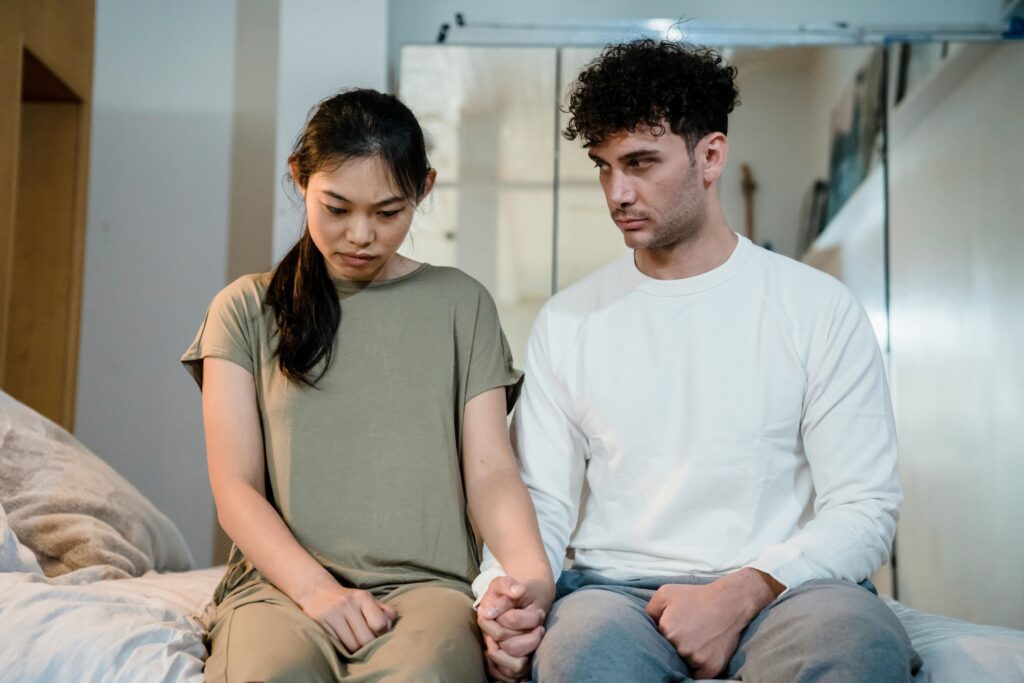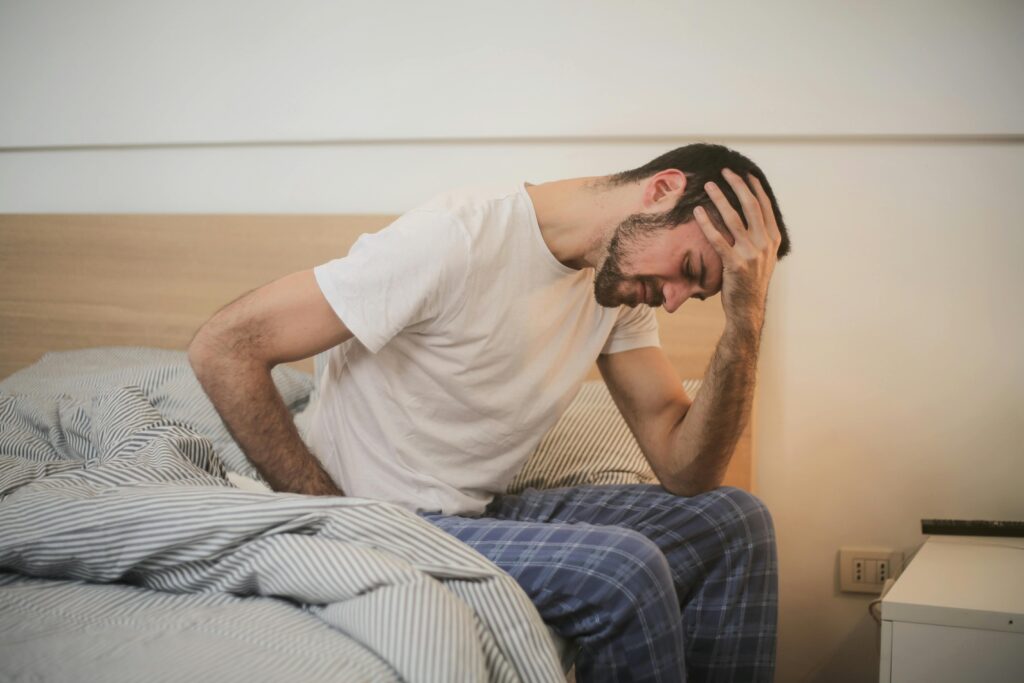For months, it’s been all pelvic pain, burning, tightness—doctor visits, pelvic floor therapy, creams that barely work. Every resource says your healing matters. And it absolutely does. But you are not the only one it affects.
How is he?
He’s been endlessly patient and kind, never pressures you, always saying “We’re okay.” But sometimes you catch it, that moment of sad in his eyes when sex doesn’t work out. Or when you’re asked (yet again), “When are you guys having kids?”
You’ve been so focused on surviving that you forget you’re both in this together.
So, tonight, you turn to him and ask, “How are you really doing with all of this? Not just with me, but with us?”
He pauses and lets out the sigh that’s been sitting on his chest for weeks. And you realize, you’ve only heard half the story.
That silent other half is what “Navigating Conflicting Ideals of Masculinity: A Qualitative Study of the Experiences of Male Partners of Women with Vulvodynia” sets out to explore. The researchers, Linn Myrtveit-Stensrud, Ph.D., Sidsel L. Schaller, Dr. Gro K. Haugstad, and Karen S. Groven, Ph.D., ask: What does masculinity look like in this space of chronic pain, lack of intimacy, and balancing emotions? How are these men coping, communicating, and connecting in these relationships?
The answers are raw and real.
Vulvodynia
Affecting between 7% and 28% of women in their lifetime, Vulvodynia is chronic pain around the vulva (female genitals). And it’s not just discomfort. It’s burning, stabbing, razor-blade-level pain that doesn’t always have a clear cause.
Women impacted by this often avoid things like sex, tight clothes, or even sitting for too long. As you’d assume, it can take a huge toll on physical health, emotional wellbeing, and—yes—relationships.
A lot of research examines how vulvodynia affects women (which is super important), but what about their significant others?
The partners, usually men in hetero relationships, are most likely the only people who see the day-to-day pain. Yet, they’re mostly left out of the conversation. However, they feel it, too. Prior studies show these partners can struggle with “anxiety, depression, and sexual dysfunction,” not to mention a lower emotional connection with their lady.
And how the man reacts to the situation can influence how much pain the woman feels. One paper even found that couples reported better sexual satisfaction just from men being more caring, even when the pain didn’t change (surprise, surprise).
Cut to this study.
Why is this research different?
It isn’t about numbers. It’s about stories, feelings, and the messy human side of this condition.
The authors conducted in-depth interviews with seven men aged 20-32, all in relationships with women who have vulvodynia. They wanted to “understand how male partners of women with vulvodynia understand and negotiate their needs in the face of cultural expectations of masculinity and sexuality.” They asked them open-ended questions like how they felt about their role in the relationship, how they handled intimacy, and what it was like navigating their partner’s pain on the daily.
These aren’t simply menfolk dealing with sexless relationships. These are men trying to show up emotionally and be the strong, stoic man-person society expects them to be.
The main idea is that these men are caught between two competing roles—caring, supportive partner and sexually confident, masculine men. And that conflict is hard.
What do men feel, say, suppress, or overcompensate for? And how can we start supporting both people in the relationship?

How are these men really doing?
Every man in the study wanted to be there for their partner. To be the ‘good guy,’ the understanding one. They offered emotional support, backed off sexually, and some even participated in treatment exercises like massage and breathing techniques. But many described these roles as emotionally draining, not what they signed up for romantically.
Matt admitted that therapy exercises made sex feel “clinical,” draining the spontaneity from intimacy. While George put it bluntly: “She could just as well use a dilator. She doesn’t need me at all.”
They felt stuck, wanting to help but worried that too much involvement in treatment might “reduce the possibility of having a positive sexual relationship later on.”
On the positive, these men are trying. And they realized that simply being present, even while stepping back sexually, helped their relationship grow in non-physical ways.
Do you even want me anymore?
Most men in the study felt rejected, not just in the bedroom, but mentally. They questioned their desirability, their masculinity, even their place in the relationships. Chris described bedtime as an emotionally fraught space where “nothing is happening,” so he avoided it altogether.
Some, like Paul, feared their partners no longer found men attractive.
Despite this, they didn’t leave; they adjusted. They learned how to show love even when the usual ways weren’t available. This included toning down sexual pressure on their partners, giving practical support, and being present in daily life.
Was it something I did?
Some men internalized their partner’s pain. Insecurity showed up around sex, the relationship, and themselves. Chris believed he might have caused his partner’s pain because he was sexually inexperienced. Others felt deceived when they learned (months or years into the relationship) about their partner’s condition.
But when communication about vulvodynia opened, it became a turning point. Arthur said, “It’s always possible to fix things or talk about things.” This clarity didn’t just ease confusion, it made sex lives safer and more intentional.
We’re fine.
Talking about infertility felt easier than talking about sex. Why? Infertility is seen as a couple’s problem, while vulvodynia is often seen as her problem.
Many of the men chose not to tell friends or family about their partner’s struggles. They weren’t ashamed of her, they felt like they were protecting her privacy.
Still, they felt caught between honesty and loyalty.
Matt said, “I don’t want to talk about other people’s secrets in any context.” Even when social pressures loomed, like being asked, ‘When are you guys having kids?’ They stayed quiet, not wanting to expose their partner’s pain.
But with no outlet, many of these men found themselves performing. In public, they put on the appearance of a successful, sexually competent man.
“If they discover that we’re not having sex, it sort of shatters that illusion.” (Chris)
However, these men consciously reframed their relationships. They stopped equating their value with sexual bravado and focused on emotional connection. Tom shared, “I love her as much today as when we began seeing each other. I’ve learned to accept the whole package, and I would never exchange her for anything in the world.”

The future for vulvodynia couples
For many participants, doing these interviews was a first—the first time talking out loud about what it’s been like to love someone with chronic sexual pain. A first-time labeling frustration, doubt, and guilt (and maybe even grief). Several claimed they had “talked more about their sexuality with the interviewer than they had ever done with their partner.”
This is huge. Not because men aren’t capable of self-reflection, but because there’s rarely space for it. These conversations gave them permission to be vulnerable, where honesty could be a turning point.
But is that enough?
Like any small study, there were limits. Only seven men, all from Scandinavia (a region known for progressive gender roles and sexual openness), participated. Also, their girlfriends had access to specialized private care. And these couples had been together for at least a year, which is important to consider because many relationships don’t survive the early stages of vulvodynia.
Despite the limits, the strengths were worth it
The questions captured emotional honesty, quiet resilience, and real moments of discovery.
And the ages (20-32 years old) reflected a range of newer to more established couplings. This allowed a look at how experiences may change across different stages of life. For instance, some were actively thinking about kids, while others weren’t. And that nuance mattered in their responses.
Most importantly, the research team put male partners in the conversation. They weren’t simply side characters, but folks with valid, layered, and, more than likely, unheard experiences.
So, what now?
Vulvodynia doesn’t affect one person; it reshapes the whole partnership. And for the men in these relationships, it forces them to redefine masculinity, intimacy, and emotional labor.
As the authors explain, “helping these men in their efforts to be good partners could benefit both themselves and their partners.” So, what should therapists, clinicians and other researchers do about this?
- Involve them in treatment conversations
- Help couples rethink what sex looks like
- Create a space for care, intimacy, and pleasure without pain
- Guide couples in gently handling rejection
- Give them tools to avoid the demand/withdraw cycles that leave both people feeling alone
Give these couples support systems that don’t treat the men like invisible bystanders. Because they’re not.
Even if penetration is never possible again, satisfaction can be. Love can be. Sex can be.




